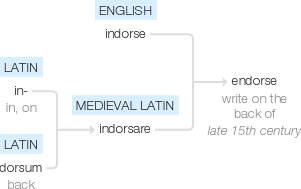Endorse
late 15th century (in the sense ‘write on the back of’; formerly also as indorse ): from medieval Latin indorsare, from Latin in- ‘in, on’ + dorsum ‘back’.
wiktionary
Alteration influenced by Medieval Latin indorsare of Middle English endosse, from Old French endosser(“to put on back”), from Latin dossum, alternative form of dorsum(“back”), [1] from which also dorsal(“of the back”). That is, the ‘r’ was dropped in Latin dossum, which developed into Old French and then Middle English endosse, and then the ‘r’ was re-introduced into English via the Medieval Latin indorsare, which had retained the ‘r’. Note that the alternative spelling indorse also uses the initial ‘i’ from Latin ( in-, rather than en-), but this form is now rare.
etymonline
endorse (v.)
c. 1400, endosse "confirm or approve" (a charter, bill, etc.), originally by signing or writing on the back of the document, from Old French endosser (12c.), literally "to put on the back," from en- "put on" (see en- (1)) + dos "back," from Latin dossum, variant of dorsum "back" (see dorsal). Assimilated 16c. in form to Medieval Latin indorsare. Figurative sense of "confirm, approve" is recorded in English first in 1847. Related: Endorsed; endorsing.
You can endorse, literally, a cheque or other papers, &, metaphorically, a claim or argument, but to talk of endorsing material things other than papers is a solecism. [Fowler]
